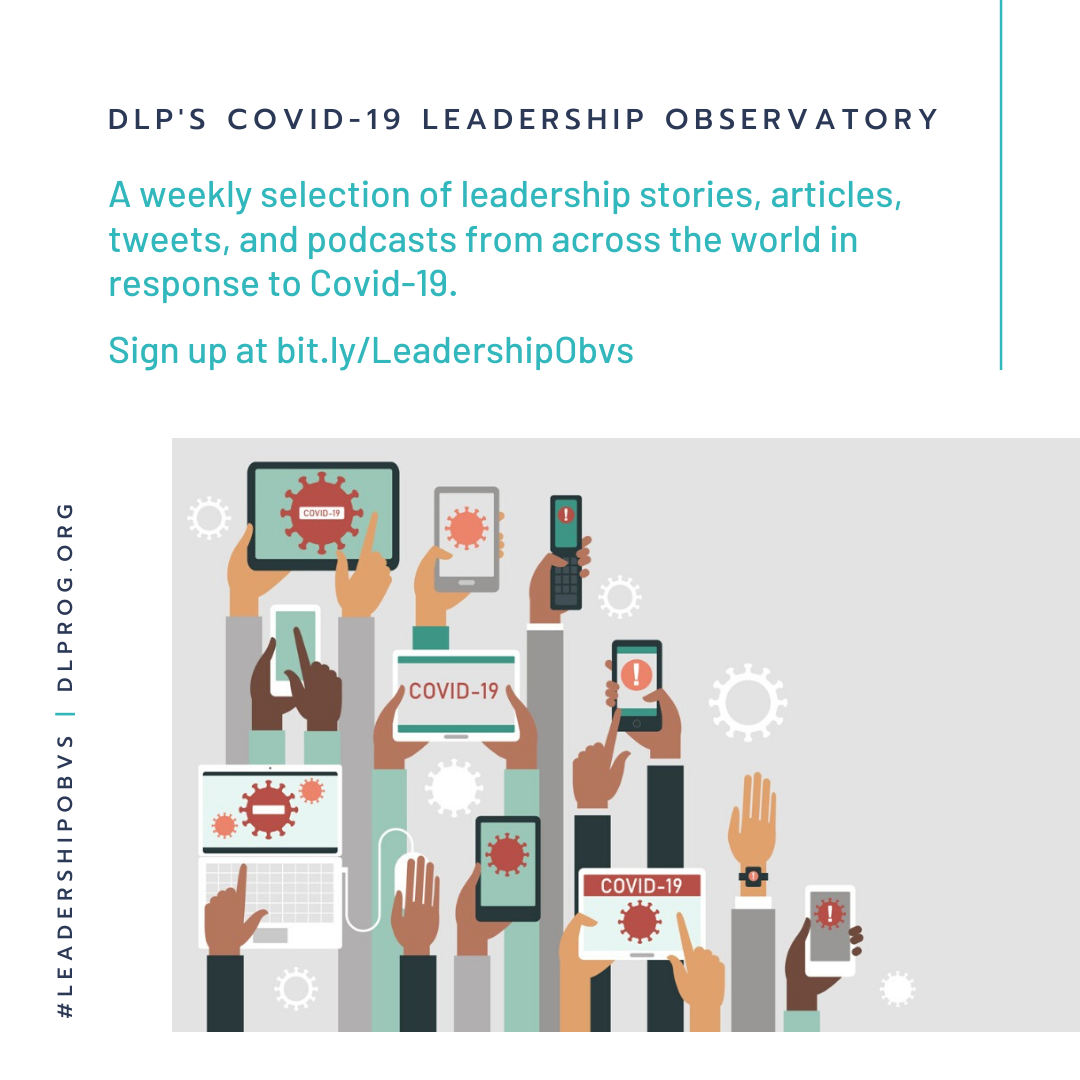Country leaders are forced to rethink their local COVID-19 strategy as virus levels fluctuate. Religious communities globally are at increased economic risk following the pandemic, and Germany may have failed to live up to its global health ambitions. This #LeadershipObvs highlights the importance of leadership in balancing health and economic outcomes, the policy support required to prevent coronavirus transmission, compliance with lockdown, and management strategies in Asia.
Salem Solomon, ‘Coronavirus Poses Leadership Test for Africa’s Heads of State’, VOA News, 11 June 2020.
Leaders in Africa have adopted various levels of lockdown and implemented a range of policies to prevent the spread of COVID-19. Many of these decisions are based on each leaders’ educational background and leadership experience. South Africa accounts for one-third of Africa’s COVID-19 testing capacity. Solomon reports on the approaches that have achieved the best health outcomes and argues how African leaders are learning from past outbreaks of AIDS and Ebola.
#LeadershipObvs in a nutshell: Leaders in Africa are facing increasing pressure to implement strategies which learn from a previous response.
Rebecca Ratcliffe, ‘Thailand, Malaysia, Vietnam… How some countries kept COVID at bay’, The Guardian, 14 June 2020.
Ratcliffe details three south-east Asian country responses to the COVID-19 pandemic in the context of the wider region. Vietnam and Cambodia are celebrated for excellent results – with zero reported fatalities. Public awareness, targeted testing and a clear distinction between politicians and health experts have been key strategies. For example, when Malaysian deputy health minister was fined for breaking strict lockdown rules this sent a strong message to the public regarding compliance. Still, failures have been apparent; for example a spike in cases in Malaysia following a mass religious gathering that was not able to be prevented.
#LeadershipObvs in a nutshell: Public awareness, targeted testing, and keeping politicians and health experts distinct have been effective leadership strategies for some south-east Asian countries during COVID-19.
Dhrubaraj BK, ‘In Nepal, Federalism, Health Policy, and the Pandemic’, The Asia Foundation, 10 June 2020.
BK argues the importance of health policy to support the COVID-19 pandemic, when the federal response has lagged. Without the Health and Sanitation Act, Nepalese authorities wouldn’t be in a position to respond effectively to coronavirus. Previous leadership in Nepal had failed to prioritise healthcare, despite Nepal experiencing many catastrophes, including floods, landslides, fires, and earthquakes. Locally, newly elected representatives often lack governance expertise. The Asia Foundation Governance Program supported seven cities to develop their own Health and Sanitation Acts.
#LeadershipObvs in a nutshell: Local governments in Nepal are introducing local Health and Sanitation Acts to reduce the spread of coronavirus.
Ewelina U. Ochab, ‘Calls For Action Amid Growing COVID-19 Pressures on Religious Communities Globally’, Forbes, 3 June 2020.
A group of politicians, religious leaders, academics and NGOs are calling for governments to create special budgets to assist religious communities who are uniquely affected by COVID-19. Religious minorities faced challenges of religious freedom before the coronavirus pandemic, which have been exacerbated by the crisis. Ochab argues for better rights and legal protection in countries of particular concern to reduce the impact on these vulnerable communities.
#LeadershipObvs in a nutshell: Coronavirus is exacerbating challenges with religious freedom calling for greater leadership support for religious communities.
Jenness Gardner, Benjamin van Rooij and Liam Smith, ‘Why do people comply: Exploring Regulation During COVID-19’, ANZSOG, 5 June 2020.
Individuals comply with restrictions when the lockdown regulations align with their morals. This webinar facilitated by Gardner from the Economic Regulation Authority, uses the Australian Survey of COVID-19 Responses to Understand Behaviour. The findings show that citizens were keen to discover new routines and habits for staying at home and keeping safe distances in public. Van Rooij argues that rules are changing too quickly, making it difficult to isolate causes of compliance.
#LeadershipObvs in a nutshell: Social norms, moral alignment, and political allegiance can impact on individual COVID-19 compliance.
Richard Summerfield, ‘More than a health crisis: leadership amid coronavirus’, Financier Worldwide, June 2020.
Looking at the COVID-19 pandemic through a business lens, Summerfield argues the need to consider economic and health outcomes simultaneously. Strong leadership is required to strengthen our modern practices of working and living, such as global supply chains and ‘just in time’. This blog explores remote working, continuity planning, lessons to be learned, and the challenges ahead. Leaders are encouraged to be agile to survive in the wake of the pandemic.
#LeadershipObvs in a nutshell: Plan, plan, and plan to demonstrate leadership resilience in an uncertain future.
Andrew Green, ‘How Germany failed to live up to its global health ambitions’, Devex, 11 June 2020.
Green argues that Germany was ill-prepared to coordinate a COVID-19 response despite following a decade of effort to advance its global health leadership. A lack of clarity on the division of labour between ministries has prevented a government-wide approach for global health. Green highlights a new window of opportunity in the coming months for Germany to centre health across all government efforts as the country witnesses the interconnectedness of its welfare with the rest of the world’s.
#LeadershipObvs in a nutshell: Governments need to practice good internal leadership to create an enabling environment for effective global health outcomes.
Sign up to receive the #LeadershipObvs directly to your inbox
A full list of leadership resources
Other resources are available on Twitter using #LeadershipObvs @DLProg











